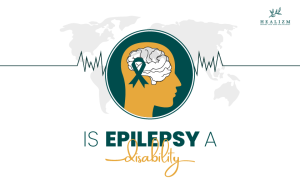
Whether you are someone living with epilepsy, care for someone who has it, or are an attentive community member – we hope you find this information helpful.
According to research, a quarter of people with intellectual disabilities also have epilepsy.
A cognitive disability means a range of intellectual or mental disabilities.
It includes:
- Thinking skills
- Impairments
- Intellectual disability
- Developmental delay
- Developmental disability
- Learning disability
To gain more information about epilepsy and its treatment, you may reach out to us at Healizm.
What Is Epilepsy?
Epilepsy is a neurological disorder.
It occurs as a result of abnormal electrical activity in the brain. It is also known as a seizure, sort of an electrical jerk inside your brain.
Seizures can happen in different forms. They might involve unusual behaviors, moods, and sometimes loss of awareness.
Some people may lose consciousness during a seizure, while others don’t.
Some stare blankly for a few seconds during a seizure.
To get additional information and support, please contact us.
Is Epilepsy a Disability? – Statistics About It
Yes, epilepsy is considered a disability by the U.S. government.
According to the World Health Organization (WHO), 50 million people worldwide live with epilepsy which makes it one of the most common neurological diseases globally.
The WHO records that disability includes experiences such as:
- Health or physical impairments
- Limitations or trouble when carrying out activities
- Losses to contribution or isolation
- Inaccessible environments
Since epilepsy causes these experiences and affect people poorly, a lot of people consider it a disability.
Epilepsy is also considered a disability according to the Social Security Administration (SSA), although the criteria is strict.
Conditions That Are Considered as Epilepsy
The SSA provides specific guidelines for evaluating epilepsy as a disabling condition. In order to be considered epilepsy by SSA, people must meet the eligibility criteria under one of the following categories:
-
Generalized tonic-clonic seizures
Documentation of recurrent seizures despite adherence to prescribed treatment.
-
Generalized non-convulsive seizures
Documentation of recurrent seizures despite adherence to prescribed treatment, with alteration of awareness or loss of consciousness.
-
Convulsive epilepsy
Documentation of recurrent seizures despite adherence to prescribed treatment, with seizures defined by either major motor seizure or lesser motor seizure.
These categories are not exhaustive and SSA may define additional eligibility criteria for specific types of epilepsy or children applying for Supplemental Security Income (SSI)
Please consult the SSA Blue Book for more detailed information and specific criteria for evaluating epilepsy as a disabling condition.
Additional Resources:
Natural Treatment for Epilepsy
Some people with epilepsy seek natural remedies and alternative therapies to alleviate their symptoms or supplement their current treatments.
There are numerous options available, including herbs, vitamins, biofeedback, and acupuncture.
-
Herbal Treatment
With an increasing market and public interest, herbal treatments have soared in popularity. There is an herb for every ailment.
Some of the most commonly used herbs for epilepsy are:
- Burning bush
- Hydrocoele
- Groundsel
- Mistletoe
- Lily
-
Vitamins
Specific vitamins may help to reduce the frequency of seizures caused by certain types of epilepsy. But keep in mind that vitamins alone are ineffective.
They may improve the efficacy of some medications or reduce the dosage required. These include the following:
- Vitamin B-6
- Magnesium
- Vitamin E
-
Dietary Changes
Specific dietary changes may also help reduce seizures. The most well-known diet is the ketogenic diet, which emphasizes eating more fats.
The keto diet is defined as a low-carb, low-protein diet. This type of eating pattern is thought to help reduce seizures, though doctors aren’t sure why.
Final Thoughts
Epilepsy is a potentially disabling situation that can negatively affect someone’s way of living.
Patients with epilepsy may be eligible for disability benefits if their seizures are severe and frequent.
To learn more about epilepsy, you can visit us at Nahil Psychiatry Services PLLC.
FAQs
Does epilepsy qualify as a disability?
Epilepsy can be classified as a disability according to the SSA if:
- The condition is medically recognized as a physical or mental impairment resulting in a lack of ability to engage in productive activity — this means the person can’t earn enough money consistently.
- The impairment is expected to lead to death or it has lasted or is expected to last for at least 12 months.
Is epilepsy an illness or disability?
Epilepsy can be considered both an illness and a disability depending on how it affects one’s life.
Can you claim disability for epilepsy?
Yes it’s possible to claim disability for epilepsy.
Can someone with epilepsy have an everyday life?
Most people with epilepsy live their everyday lives and participate in activities and events. Nevertheless, the risk of early death is more than that of ordinary people.
